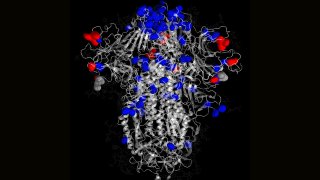
The Mexican government confirmed the first case of the omicron variant of COVID-19 after a 51-year-old person tested positive after returning from a trip to South Africa.
The undersecretary of health, Hugo López Gatell, gave details of the case through his Twitter account.
López Gatell said the patient has mild symptoms, so it is believed that he will make a full recovery. The undersecretary added that a virological surveillance protocol was established Nov. 26 that ealy identifies cases of COVID-19 in people arriving from any country.
Get top local stories in San Diego delivered to you every morning. Sign up for NBC San Diego's News Headlines newsletter.
"Closing borders and blocking people or goods are not useful measures to contain the variants," López Gatell tweeted.
The patient returned to Mexico on Nov. 21. Six days later, he was experiencing mild symptoms of COVID-19, according to a statement from the General Directorate of Epidemiology.
The person received care in a private hospital in Mexico City on Nov. 29, when an antigen test and RT-PCR test were performed, both of which were positive.
Positive cases show the presence of the omicron variant of the coronavirus have now been discovered in Los Angeles, San Francisco, Colorado, New York, Minnesota and New York.
New COVID-19 cases in South Africa have burgeoned from about 200 a day in mid-November to more than 16,000 on Friday. Omicron was detected over a week ago in the country’s most populous province, Gauteng, and has since spread to all eight other provinces, Health Minister Joe Phaahla said.
Even with the rapid increase, infections are still below the 25,000 new daily cases that South Africa reported in the previous surge, in June and July.
Little is known about the new variant, but the spike in South Africa suggests it might be more contagious, said Dr. Sikhulile Moyo, the scientist who may have been the first to identify the new variant, though researchers in neighboring South Africa were close on his heels. Omicron has more than 50 mutations, and scientists have called it a big jump in the evolution of the virus.
It’s not clear if the variant causes more serious illness or can evade the protection of vaccines. Phaahla noted that only a small number of people who have been vaccinated have gotten sick, mostly with mild cases, while the vast majority of those who have been hospitalized were not vaccinated.
But in a worrisome development, South African scientists reported that omicron appears more likely than earlier variants to cause reinfections among people who have already had a bout with COVID-19.
The Associated Press contributed to this report -- Ed.



